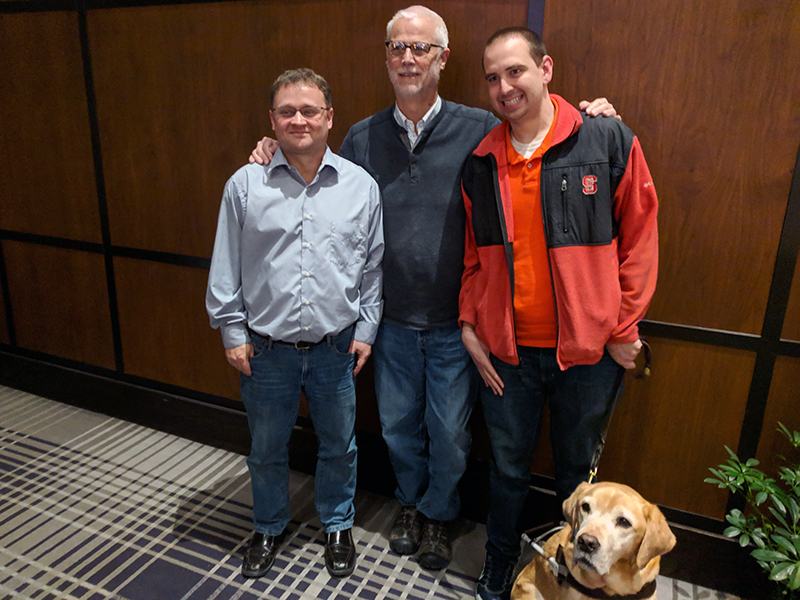
Allen School professor Richard Ladner, a leading advocate for making computer science education accessible to all, and a team of collaborators earned a Best Paper Award for their work on “Computer Science Principles for Teachers of Blind and Visually Impaired Students” at the recent SIGCSE 2019, the flagship conference of the Association for Computing Machinery’s Special Interest Group in Computer Science Education.
Computer Science Principles (CSP) is a new Advanced Placement (AP) course developed by the College Board, in collaboration with computer science educators, to enable high school students to learn about computational concepts and practices while earning optional college credit or placement. In contrast to prior AP computer science courses, CSP was designed to appeal to the broadest possible spectrum of students with the goal of increasing participation in computing, particularly among groups that are underrepresented in the field. While demographic data on recent CSP exam-takers indicates that forward progress has been made in engaging more students from multiple underrepresented groups, one population was missing from the dataset: students with disabilities.
In their award-winning paper, Ladner and his co-authors — professor Andreas Stefik and software engineering student William Allee of the University of Nevada, Las Vegas, and Sean Mealin, a Ph.D. student at North Carolina State University — partnered with Code.org to perform a comprehensive review of its CSP curriculum and tools to determine how much of the content meets accessibility standards and, in the case of online content, could be used with screen readers and other technologies by students who are visually impaired. The team discovered that most of the online content — in particular, creative, interactive tools such as App Lab programming tool that rely on blocks-based rather than text-based code — are not screen-reader accessible and do not adhere to accepted web accessibility standards. They found the problem extended offline, where the so-called unplugged activities that supplement the online content heavily relied on visual metaphors and artifacts to convey concepts. In one example cited by the researchers, the “Flippy Do” template that teaches students binary numbers requires students to cut and fold a piece of paper along printed lines, then fill in blank spaces — an activity that is not accessible to students with visual impairments or certain other physical disabilities.
At Code.org’s invitation, Ladner and his collaborators spent more than a year modifying the CSP curriculum, with a particular focus on developing accessible alternatives to the visually-based unplugged activities. They also partnered with external experts to develop accessible interactive tools to replace those that were inaccessible in the original online curriculum, using the Quorum web-based programming environment that has accessibility as a primary design goal, and made the source code available to teachers and students to customize the tools to better meet their needs.
To understand how the original curriculum and proposed modifications would work in the wild, the team organized a professional development workshop with teachers having varied experience in developing or adapting computer science curriculum for students who are blind or visually impaired. The teachers were drawn from different settings, including residential schools and public school districts, to gain diverse perspectives on how the CSP curriculum is used and understand the challenges educators face in adapting content for their students. During the workshop, which took place over the course of a week, the research team gathered feedback from participants on Code.org’s online CSP curriculum and tools, the College Board’s procedures with regard to students who are blind, and its proposed modifications for making other implementations of CSP more accessible. Recommendations included encouraging teachers to make modifications themselves using an array of accessibility tools, and to share those modifications with others, and urging AP CSP curriculum providers to arrange for a complete evaluation of their content to be performed by a qualified accessibility professional and make necessary modifications to better serve the needs of teachers and students. Participants also emphasized the need for the College Board, which oversees the AP CSP exam, to clarify its procedures governing practice examples, which tend to be purely visual in nature, and the accommodations permitted during the exam, and to alter the use of Braille math on the exam to account for the existence of two, competing standards.
“If we are to embrace equity and computer science for all, we have to really mean it. Accessibility should be the default, not an afterthought,” said Ladner. “I give Code.org a lot of credit for opening up their curriculum to scrutiny and for working with us to identify strategies for making it truly accessible to all. Our hope is that this effort will serve as a blueprint for other curriculum providers to improve the accessibility of their content and increase educational opportunities for a population that is often overlooked in online curriculum development.”
The SIGCSE conference attracts more than 1,500 educators, researchers and practitioners interested in improving computer science education at the K-12 and postsecondary levels. Read the team’s research paper here, and learn about Code.org’s new accessible CSP curriculum here. Last December, Code.org recognized Ladner, Stefik and their collaborators at AccessCSforAll as part of its Champions for Computer Science Awards for their leadership in making CS education accessible to all students.
Way to go, Richard, Andreas, William and Sean!

